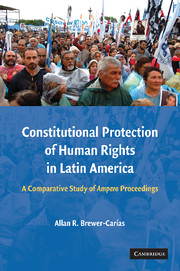 Constitutional Protection of Human Rights in Latin America
Constitutional Protection of Human Rights in Latin America Book contents
- Frontmatter
- Contents
- INTRODUCTION
- PART ONE THE CONSTITUTIONAL AND INTERNATIONAL DECLARATION OF HUMAN RIGHTS AND ITS JUDICIAL GUARANTIES
- PART TWO THE AMPARO AS A LATIN AMERICAN CONSTITUTIONAL AND INTERNATIONAL LAW INSTITUTION
- PART THREE THE INJURED PARTY AND THE CONSTITUTIONAL RIGHTS PROTECTED BY MEANS OF THE AMPARO PROCEEDING
- PART FOUR THE INJURY, THE INJURING PARTY AND THE INJURING ACTS OR OMISSIONS IN THE AMPARO PROCEEDING
- Chapter Twelve The General Conditions of the Injury (Harms and Threats)
- Chapter Thirteen The Reparable Character of the Harms and the Restorative Character of the Amparo Proceeding
- Chapter Fourteen The Imminent Character of the Threats and the Preventive Character of the Amparo Proceeding
- Chapter Fourteen The Injuring Party: The Defendant (Public Entities or Private Individuals)
- Chapter Sixteen The Injuring Public Actions and Omissions of Public Authorities Causing the Harms or the Threats
- PART FIVE THE EXTRAORDINARY CHARACTER OF THE AMPARO PROCEEDING
- CONCLUSION
- APPENDIX A List of Latin American Constitutions
- APPENDIX B List of Latin American Amparo Laws (Statutes)
- INDEX
Chapter Sixteen - The Injuring Public Actions and Omissions of Public Authorities Causing the Harms or the Threats
Published online by Cambridge University Press: 08 August 2009
- Frontmatter
- Contents
- INTRODUCTION
- PART ONE THE CONSTITUTIONAL AND INTERNATIONAL DECLARATION OF HUMAN RIGHTS AND ITS JUDICIAL GUARANTIES
- PART TWO THE AMPARO AS A LATIN AMERICAN CONSTITUTIONAL AND INTERNATIONAL LAW INSTITUTION
- PART THREE THE INJURED PARTY AND THE CONSTITUTIONAL RIGHTS PROTECTED BY MEANS OF THE AMPARO PROCEEDING
- PART FOUR THE INJURY, THE INJURING PARTY AND THE INJURING ACTS OR OMISSIONS IN THE AMPARO PROCEEDING
- Chapter Twelve The General Conditions of the Injury (Harms and Threats)
- Chapter Thirteen The Reparable Character of the Harms and the Restorative Character of the Amparo Proceeding
- Chapter Fourteen The Imminent Character of the Threats and the Preventive Character of the Amparo Proceeding
- Chapter Fourteen The Injuring Party: The Defendant (Public Entities or Private Individuals)
- Chapter Sixteen The Injuring Public Actions and Omissions of Public Authorities Causing the Harms or the Threats
- PART FIVE THE EXTRAORDINARY CHARACTER OF THE AMPARO PROCEEDING
- CONCLUSION
- APPENDIX A List of Latin American Constitutions
- APPENDIX B List of Latin American Amparo Laws (Statutes)
- INDEX
Summary
Being the amparo action originally established to defend constitutional rights from State and authorities violations, the most common and important injuring parties in the amparo proceedings regulations in Latin America are, of course, the public authorities or public officials when their acts or omissions, whether of legislative, executive or judicial nature, cause the harm or threats.
The general principle in this matter, with some exceptions, is that any authority can be questioned through amparo actions, and that any act, fact or omission of any public authority or entity or public officials causing an injury to constitutional rights can be challenged by means of such actions. It is in this sense that the Guatemalan Amparo Law sets forth the principle that “no sphere shall be excluded from amparo,” being admitted against “any act, resolution, disposition and statute of authority which could imply a threat, a restriction or a violation of the rights guarantied in the Constitution and in statutes” (Article 8).
This is the same wording used in the Amparo Law of Venezuela, providing that the action can be filed against “any fact, act or omission of any of the National, State, or Municipal branches of government” (Poderes Públicos) (Article 2); which mean that the constitutional protection can be filed against any public action, that is, any formal state act, any substantive or any factual activity (vía de hecho) (Article 5); as well as against any omission from public entities.
- Type
- Chapter
- Information
- Constitutional Protection of Human Rights in Latin AmericaA Comparative Study of Amparo Proceedings, pp. 305 - 328Publisher: Cambridge University PressPrint publication year: 2008


